Filter by
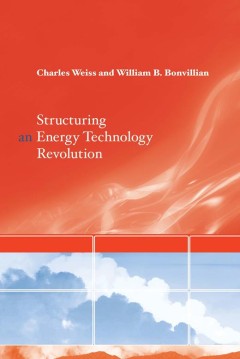
Structuring an Energy Technology Revolution
An argument for a major federal program to stimulate innovation in energy technology and a proposal for a policy approach to implement it.OCLC-licensed vendor bibliographic record.
- Edition
- -
- ISBN/ISSN
- 9780262255516
- Collation
- 1 online resource (xi, 318 pages)
- Series Title
- -
- Call Number
- -
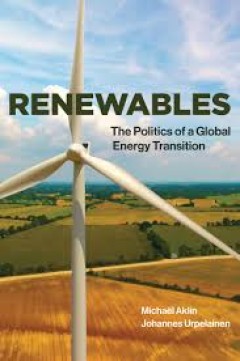
Renewables :the politics of a global energy transition
A comprehensive political analysis of the rapid growth in renewable wind and solar power, mapping an energy transition through theory, case studies, and policy.OCLC-licensed vendor bibliographic record.
- Edition
- -
- ISBN/ISSN
- 9780262344609
- Collation
- 1 online resource
- Series Title
- -
- Call Number
- -
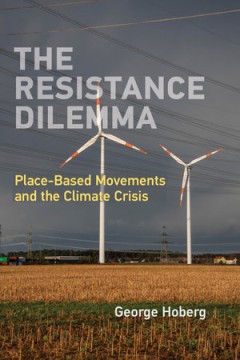
The resistance dilemma :place-based movements and the climate crisis
"The book focuses on a strategic choice by the North American wing of the global climate movement: to ally themselves with place-based interests, including Indigenous groups, to block new coal plants, coal port expansion, fracking, and more recently, oil sands pipelines. The strategy by climate activists to target fossil fuel infrastructure has been effective at movement building and driving po…
- Edition
- -
- ISBN/ISSN
- 9780262367158
- Collation
- 1 online resource.
- Series Title
- -
- Call Number
- -
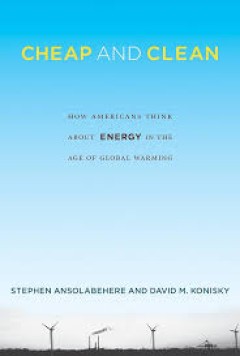
Cheap and Clean: How Americans Think about Energy in the Age of Global Warming
"How do Americans think about energy? Is the debate over fossil fuels highly partisan and ideological? Does public opinion about fossil fuels and alternative energies divide along the fault between red states and blue states? And how much do concerns about climate change weigh on their opinions? In Cheap and Clean, Stephen Ansolabehere and David Konisky show that Americans are more pragmatic th…
- Edition
- -
- ISBN/ISSN
- 0262321068
- Collation
- 1 online resource (x, 261 pages)
- Series Title
- -
- Call Number
- -

Energy at the End of the World: An Orkney Islands Saga
Making local energy futures, from marine energy to hydrogen fuel, at the edge of the world.OCLC-licensed vendor bibliographic record.
- Edition
- -
- ISBN/ISSN
- 9780262349659
- Collation
- 1 online resource.
- Series Title
- -
- Call Number
- -
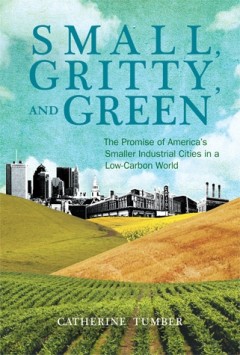
Small, Gritty, and Green: The Promise of America's Smaller Industrial Cities …
How small-to-midsize Rust Belt cities can play a crucial role in a low-carbon, sustainable, and relocalized future.OCLC-licensed vendor bibliographic record.
- Edition
- -
- ISBN/ISSN
- 9780262302708
- Collation
- 1 online resource (xxxiv, 211 pages) :illustrations.
- Series Title
- -
- Call Number
- -
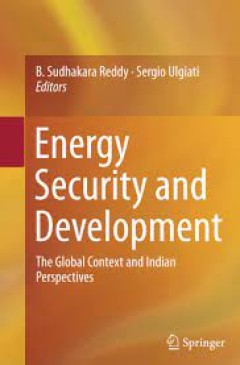
Energy Security and Development the Global Context and Indian Perspectives
This volume provides a systematic framework for energy suppliers, policy makers, academics, students, and all others interested in energy security, and analyzes key issues concerning energy, security and sustainability with the help of a wealth of data. While sustainability is the broadest objective, energy security is an important part of it, at the global, national and societal levels. The de…
- Edition
- 1
- ISBN/ISSN
- 978-81-322-2065-7
- Collation
- 117 b/w illustrations
- Series Title
- -
- Call Number
- -

Electrify :an optimist's playbook for our clean energy future
"Saul Griffith lays out an accessible, rigorously-researched plan to decarbonize the U.S. economy in time to address climate change. His plan, in short, is to "electrify everything." Griffith uses his deep understanding of U.S. energy flows, materials, and clean energy technologies to show that decarbonizing in time to meet climate goals is not only possible, but can be done without major sacri…
- Edition
- -
- ISBN/ISSN
- 0262367289
- Collation
- 1 online resource.
- Series Title
- -
- Call Number
- -

The globalization of clean energy technology :lessons from China
The development and deployment of cleaner energy technologies have become globalized phenomena. Yet despite the fact that energy-related goods account for more than ten percent of international trade, policy makers, academics, and the business community perceive barriers to the global diffusion of these emerging technologies. Experts point to problems including intellectual property concerns, t…
- Edition
- -
- ISBN/ISSN
- 0262322099
- Collation
- 1 online resource (xi, 261 pages) :illustrations.
- Series Title
- -
- Call Number
- -

Unlocking energy innovation :how America can build a low-cost, low-carbon ene…
"The authors outline three waves of energy innovation to reveal how America can speed up the introduction of new technologies and business models and accelerate deployment on a massive scale"--Publisher.OCLC-licensed vendor bibliographic record.
- Edition
- -
- ISBN/ISSN
- 9780262300179
- Collation
- 1 online resource (xiv, 216 pages) :illustrations
- Series Title
- -
- Call Number
- -
 Computer Science, Information & General Works
Computer Science, Information & General Works  Philosophy & Psychology
Philosophy & Psychology  Religion
Religion  Social Sciences
Social Sciences  Language
Language  Pure Science
Pure Science  Applied Sciences
Applied Sciences  Art & Recreation
Art & Recreation  Literature
Literature  History & Geography
History & Geography